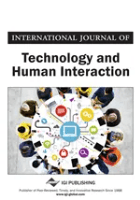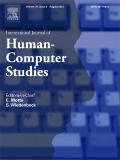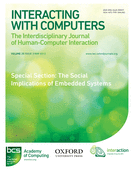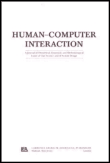
International Journal of Technology and Human Interaction
Scope & Guideline
Bridging the Gap Between Technology and Human Behavior
Introduction
Aims and Scopes
- Human-Technology Interaction:
The journal emphasizes the study of how individuals interact with technology, including user acceptance, usability, and user experience across various platforms and devices. - Impact of Technology on Work and Learning:
Research frequently addresses the implications of technology on work performance, mental health, and learning outcomes, reflecting the journal's commitment to understanding how digital tools affect productivity and education. - Social Media and Digital Communication:
The journal explores themes surrounding social media usage, its effects on communication, and the dynamics of online interactions, particularly during significant events such as the COVID-19 pandemic. - Adoption of Emerging Technologies:
A core area of research includes the acceptance and adoption of new technologies, such as AI, IoT, and e-learning platforms, focusing on factors that influence user intentions and behaviors. - Behavioral and Psychological Aspects of Technology Use:
The journal investigates the psychological impacts of technology, including issues like technology-induced stress, addiction, and the implications of digital interfaces on user behavior.
Trending and Emerging
- AI and Machine Learning Applications:
Recent publications increasingly explore the applications of AI and machine learning in various domains, such as education, marketing, and social media, highlighting the growing relevance of these technologies in everyday life. - Mental Health and Technology:
There is a rising interest in the relationship between technology use and mental health, particularly concerning work-related stress and the psychological impacts of digital communication. - User Experience Research:
A significant trend is the focus on enhancing user experience (UX) through empirical studies, evaluating the usability of interfaces and the impact of design choices on user satisfaction. - E-learning and Remote Education:
The journal has seen a surge in research related to e-learning and remote education, especially in the context of the pandemic, addressing the effectiveness and challenges of digital learning environments. - Social Media Dynamics:
Emerging themes include the analysis of social media behaviors, particularly how user characteristics influence engagement and communication patterns, reflecting the growing importance of digital social interactions.
Declining or Waning
- Traditional Marketing Strategies:
There has been a noticeable decrease in studies focusing on conventional marketing strategies, as the journal shifts towards more digitally-centered marketing practices, particularly in social media and e-commerce. - Basic Information Technology Training:
Research on fundamental IT training or literacy programs has diminished, potentially due to the increasing assumption that users possess baseline technology skills, shifting focus to more advanced applications. - Static Uses of Technology in Education:
Papers that previously examined static or traditional educational technology implementations are less frequent, as the emphasis now leans towards dynamic, interactive learning environments and blended approaches.
Similar Journals

Australasian Journal of Information Systems
Empowering Knowledge in Information Systems.The Australasian Journal of Information Systems (AJIS), published by the University of Canberra’s Faculty of Information Sciences & Engineering, is a leading open-access journal that has been fostering scholarly communication in the realms of information systems and technology since its inception in 1993. With an ISSN of 1449-8618 and E-ISSN 1326-2238, the journal is headquartered in Australia and provides a platform for innovative research and thought leadership in key areas such as business management, human-computer interaction, and information systems management. Recognized for its quality and impact, AJIS boasts a commendable Q2 ranking in several categories including Information Systems, reflecting its relevance and significance in the academic community. Researchers, professionals, and students alike will find this journal not only instrumental for advancing their knowledge but also essential for engaging with contemporary issues and trends in information sciences. With a commitment to open access, AJIS ensures that high-quality research is widely accessible, fostering collaboration and discourse across international boundaries.

Cyberpsychology Behavior and Social Networking
Unraveling the Dynamics of Digital BehaviorCyberpsychology Behavior and Social Networking is a leading international journal dedicated to the exploration of the intricate relationship between psychology and digital interactions. Published by Mary Ann Liebert, Inc, this esteemed journal boasts a strong impact factor, reflecting its significance in the fields of psychology, communication, and computer science. With a broad scope encompassing topics such as social networking, online behavior, and human-computer interaction, the journal aims to provide a vital platform for researchers, professionals, and students to share innovative research and insights. Recognized as a Q1 journal across multiple categories, including Applied Psychology and Human-Computer Interaction, it ranks impressively among its peers, underscoring its influence in advancing academic discourse. Additionally, the journal offers open access options, enhancing the visibility and accessibility of published work to a diverse audience. As digital technologies continue to evolve, Cyberpsychology Behavior and Social Networking remains at the forefront, fostering scholarly dialogue that navigates the psychological ramifications of our increasingly interconnected digital lives.

KSII Transactions on Internet and Information Systems
Innovating Solutions in Internet Technology and Information Systems.KSII Transactions on Internet and Information Systems is a leading academic journal dedicated to advancing the fields of Internet technology and information systems. Published by the KSII-Kor Soc Internet Information, this journal has established itself as a significant contributor to research since its inception in 2007, with a focus on innovative solutions and methodologies in computer networks and communications as well as information systems. With a Category Quartile of Q3 in both fields for 2023, it ranks in the 44th percentile among its peers according to Scopus, making it a reputable platform for authors to share their findings. While available in print, the journal also promotes open access, ensuring broad dissemination of research findings. The editorial team is committed to maintaining high scholarly standards and relevance, inviting contributions from researchers, professionals, and students eager to push the boundaries of knowledge in today's rapidly evolving digital landscape. For those engaged in or studying these dynamic fields, the KSII Transactions on Internet and Information Systems remains an invaluable resource for cutting-edge research.

Internet Research
Decoding the Internet's Influence on Society and EconomyInternet Research, published by Emerald Group Publishing Ltd, stands as a pivotal peer-reviewed journal in the domains of communication, economics, and sociology. Established in 1991, it has continually advanced the understanding of how the internet influences human interaction, economic behaviors, and sociopolitical structures. With impressive ranking achievements, including Q1 status in Communication, Economics and Econometrics, and Sociology and Political Science, the journal is recognized for its high impact, evidenced by its outstanding Scopus rankings—28th in Sociology and Political Science and 12th in Communication, highlighting its relevance and quality within the academic community. While the journal is not open access, its selective publication of landmark research attracts a dedicated readership of scholars, professionals, and students eager to explore the multidimensional impacts of the digital age. With a focus on innovative methodologies and empirical findings, Internet Research aims to foster scholarly discourse that shapes our understanding of the evolving online landscape through 2024 and beyond.

INTERNATIONAL JOURNAL OF HUMAN-COMPUTER STUDIES
Unveiling the Dynamics of Human-Technology CollaborationINTERNATIONAL JOURNAL OF HUMAN-COMPUTER STUDIES, published by Academic Press Ltd - Elsevier Science Ltd, stands at the forefront of research dedicated to the dynamic interplay between humans and technology. With a remarkable impact factor reflective of its rigorous academic standards and its prestigious ranking in the Q1 category across vital disciplines such as Education, Engineering, Human Factors and Ergonomics, and Human-Computer Interaction, this journal serves as an essential resource for researchers, professionals, and students alike. Spanning from 1994 to 2024, it showcases pioneering studies that contribute significantly to the understanding of cognitive processes, usability, and the evolving role of technology in society. Despite the absence of Open Access options, access to this journal is facilitated through institutional subscriptions, ensuring that critical findings and advancements are readily available to a global audience. By continuing to publish high-quality research, the INTERNATIONAL JOURNAL OF HUMAN-COMPUTER STUDIES plays a crucial role in advancing the field, fostering innovation, and guiding future research directions.

IADIS-International Journal on Computer Science and Information Systems
Fostering Excellence in Information Systems ResearchIADIS-International Journal on Computer Science and Information Systems is a prominent platform dedicated to advancing research and knowledge in the field of computer science and information systems. Published by IADIS, this journal aims to disseminate innovative findings and theoretical advancements that address contemporary challenges and trends in technology. The journal fosters a rigorous peer-review process, ensuring that only high-quality research is shared with its audience, which includes researchers, professionals, and students from around the globe. Although the journal is not currently open access, it serves as a vital resource for those looking to deepen their understanding of the evolving landscape of computer science. The ISSN of this journal is 1646-3692, and it boasts a strong commitment to promoting interdisciplinary communication and collaboration in the realm of information technology, making it an essential read for anyone looking to stay at the forefront of this fast-paced field.

Journal of Organizational and End User Computing
Advancing Knowledge at the Intersection of Technology and ManagementThe Journal of Organizational and End User Computing, published by IGI Global, is a leading peer-reviewed outlet dedicated to exploring the intersection of organizational practices and user interfaces within the digital realm. With a robust ISSN of 1546-2234 and an E-ISSN of 1546-5012, the journal has established itself as a crucial resource for scholars and practitioners in the fields of Computer Science Applications, Human-Computer Interaction, and Strategy and Management. Recognized for its quality, the journal attained Q3 status in Computer Science Applications and Human-Computer Interaction, and Q2 status in Strategy and Management in 2023, reflecting its esteemed position in academic rankings. Operating from the heart of the United States, the journal has converged its focus from 2004 to 2024, making it a reliable source for cutting-edge research and industry trends. Although it does not offer open access, the Journal of Organizational and End User Computing remains an invaluable repository of knowledge, perfect for researchers, professionals, and students seeking to advance their understanding of organizational structures and user engagement in computing environments.

INTERACTING WITH COMPUTERS
Unveiling the Dynamics of Digital EngagementINTERACTING WITH COMPUTERS is a renowned journal published by Oxford University Press, focusing on the interdisciplinary field of Human-Computer Interaction, as well as aspects of Library and Information Sciences and Software. With a rich history of publication since 1989, this journal has established itself as a significant platform for scholars to disseminate cutting-edge research and innovative methodologies that enhance our understanding of how humans engage with technology. Despite being classified in the Q3 and Q2 quartiles across various categories, its 2023 Scopus rankings highlight its relevance, positioning it within the 69th percentile for Library and Information Sciences. This makes it an essential resource for researchers, professionals, and students looking to stay informed about the latest advancements and discussions in this rapidly evolving domain. Though not currently open access, INTERACTING WITH COMPUTERS offers substantial insights that are crucial for driving forward the conversation in Human-Computer Interaction, ensuring its relevance in both academic and applied contexts.

HUMAN-COMPUTER INTERACTION
Pioneering Research in Human-Computer DynamicsHUMAN-COMPUTER INTERACTION is a premier academic journal published by Taylor & Francis Inc, dedicated to the interdisciplinary field of HCI, which explores the dynamic interactions between humans and computers. With its ISSN 0737-0024 and E-ISSN 1532-7051, the journal maintains a strong presence within the academic community and is recognized for its significant impact, holding a commendable impact factor that underscores its relevance. Ranked in the Q1 category for both Applied Psychology and Human-Computer Interaction, it occupies a critical position in Scopus rankings, listed as #15 in Applied Psychology and #11 in Computer Science, Human-Computer Interaction, placing it in the top 6% of relevant fields. Covering a broad spectrum of topics from usability studies to user experience design, the journal aims to facilitate innovative research and provide insights that bridge theoretical frameworks and practical applications. Published since 1985 and continuously evolving, HUMAN-COMPUTER INTERACTION remains an essential resource for researchers, professionals, and students eager to contribute to and benefit from advances in understanding how technology can effectively serve human needs.

INTERNATIONAL JOURNAL OF INFORMATION MANAGEMENT
Elevating research standards in artificial intelligence and communications.International Journal of Information Management, published by Elsevier Science Ltd, is a premier journal dedicated to advancing the field of information management and its associated disciplines. With an impressive impact factor and categorized in the Q1 quartile across multiple domains such as Artificial Intelligence, Computer Networks and Communications, Information Systems, and Library and Information Sciences, this journal stands at the forefront of research excellence. Established in 1970 and running through to 2025, it serves as a vital platform for disseminating influential research and innovative ideas within these rapidly evolving fields. The journal's rigorous peer-review process ensures that only the highest quality research is published, thereby fostering academic discourse and collaboration among researchers, professionals, and students globally. Although it does not currently offer open access, the journal provides essential access options through institutional subscriptions, making groundbreaking research accessible to a broad audience. By continually adapting to the dynamic landscape of information management, the International Journal of Information Management reinforces its significance as a leading source of knowledge and insight for those dedicated to the advancement of science and practice in this vital sector.